Teaching and Learning: Reflective Journal on Teaching Pedagogy of the 21st Century
VerifiedAdded on 2023/05/31
|6
|1769
|344
AI Summary
This reflective journal is based on teaching and learning in an intercultural environment that reinforces teaching pedagogy according to the 21st century. It emphasizes the four C's of teaching: critical thinking, collaboration, communication, and creativity. The author shares their experiences related to teaching and learning and how they have integrated the four C's principles into their future planning of teaching practice. The importance of reflective practice in effective teaching or learning practice is also discussed.
Contribute Materials
Your contribution can guide someone’s learning journey. Share your
documents today.
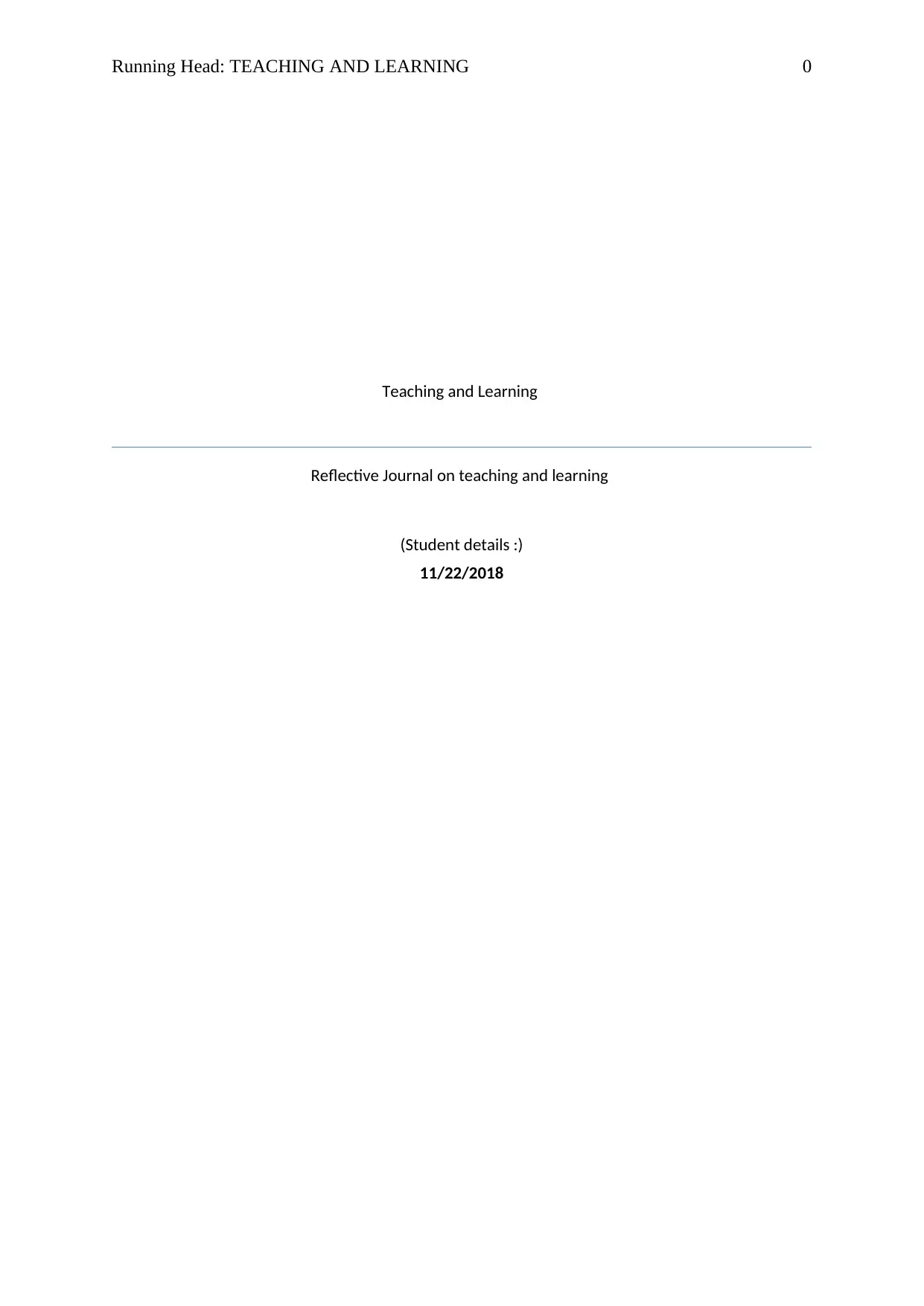
Running Head: TEACHING AND LEARNING 0
Teaching and Learning
Reflective Journal on teaching and learning
(Student details :)
11/22/2018
Teaching and Learning
Reflective Journal on teaching and learning
(Student details :)
11/22/2018
Secure Best Marks with AI Grader
Need help grading? Try our AI Grader for instant feedback on your assignments.
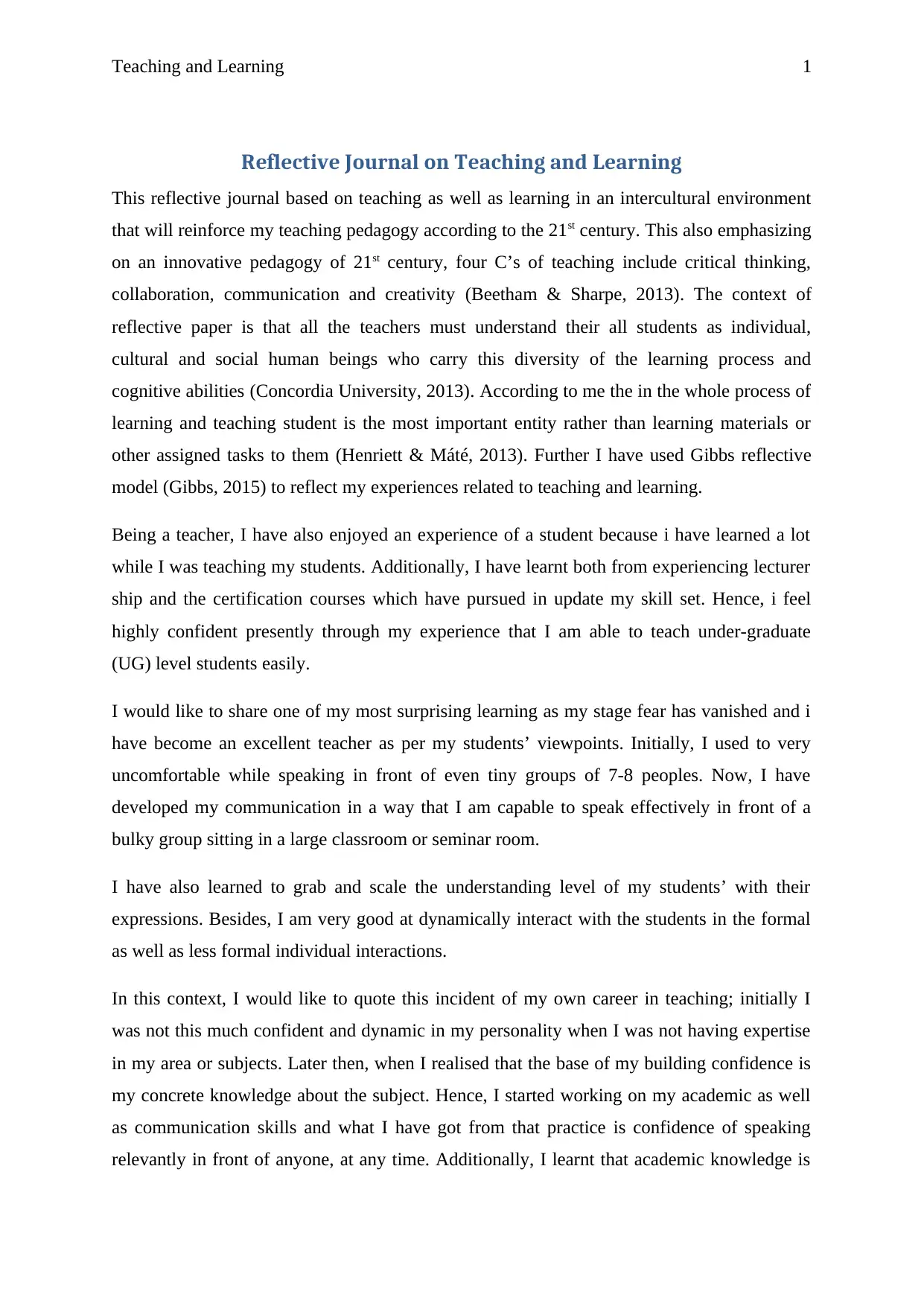
Teaching and Learning 1
Reflective Journal on Teaching and Learning
This reflective journal based on teaching as well as learning in an intercultural environment
that will reinforce my teaching pedagogy according to the 21st century. This also emphasizing
on an innovative pedagogy of 21st century, four C’s of teaching include critical thinking,
collaboration, communication and creativity (Beetham & Sharpe, 2013). The context of
reflective paper is that all the teachers must understand their all students as individual,
cultural and social human beings who carry this diversity of the learning process and
cognitive abilities (Concordia University, 2013). According to me the in the whole process of
learning and teaching student is the most important entity rather than learning materials or
other assigned tasks to them (Henriett & Máté, 2013). Further I have used Gibbs reflective
model (Gibbs, 2015) to reflect my experiences related to teaching and learning.
Being a teacher, I have also enjoyed an experience of a student because i have learned a lot
while I was teaching my students. Additionally, I have learnt both from experiencing lecturer
ship and the certification courses which have pursued in update my skill set. Hence, i feel
highly confident presently through my experience that I am able to teach under-graduate
(UG) level students easily.
I would like to share one of my most surprising learning as my stage fear has vanished and i
have become an excellent teacher as per my students’ viewpoints. Initially, I used to very
uncomfortable while speaking in front of even tiny groups of 7-8 peoples. Now, I have
developed my communication in a way that I am capable to speak effectively in front of a
bulky group sitting in a large classroom or seminar room.
I have also learned to grab and scale the understanding level of my students’ with their
expressions. Besides, I am very good at dynamically interact with the students in the formal
as well as less formal individual interactions.
In this context, I would like to quote this incident of my own career in teaching; initially I
was not this much confident and dynamic in my personality when I was not having expertise
in my area or subjects. Later then, when I realised that the base of my building confidence is
my concrete knowledge about the subject. Hence, I started working on my academic as well
as communication skills and what I have got from that practice is confidence of speaking
relevantly in front of anyone, at any time. Additionally, I learnt that academic knowledge is
Reflective Journal on Teaching and Learning
This reflective journal based on teaching as well as learning in an intercultural environment
that will reinforce my teaching pedagogy according to the 21st century. This also emphasizing
on an innovative pedagogy of 21st century, four C’s of teaching include critical thinking,
collaboration, communication and creativity (Beetham & Sharpe, 2013). The context of
reflective paper is that all the teachers must understand their all students as individual,
cultural and social human beings who carry this diversity of the learning process and
cognitive abilities (Concordia University, 2013). According to me the in the whole process of
learning and teaching student is the most important entity rather than learning materials or
other assigned tasks to them (Henriett & Máté, 2013). Further I have used Gibbs reflective
model (Gibbs, 2015) to reflect my experiences related to teaching and learning.
Being a teacher, I have also enjoyed an experience of a student because i have learned a lot
while I was teaching my students. Additionally, I have learnt both from experiencing lecturer
ship and the certification courses which have pursued in update my skill set. Hence, i feel
highly confident presently through my experience that I am able to teach under-graduate
(UG) level students easily.
I would like to share one of my most surprising learning as my stage fear has vanished and i
have become an excellent teacher as per my students’ viewpoints. Initially, I used to very
uncomfortable while speaking in front of even tiny groups of 7-8 peoples. Now, I have
developed my communication in a way that I am capable to speak effectively in front of a
bulky group sitting in a large classroom or seminar room.
I have also learned to grab and scale the understanding level of my students’ with their
expressions. Besides, I am very good at dynamically interact with the students in the formal
as well as less formal individual interactions.
In this context, I would like to quote this incident of my own career in teaching; initially I
was not this much confident and dynamic in my personality when I was not having expertise
in my area or subjects. Later then, when I realised that the base of my building confidence is
my concrete knowledge about the subject. Hence, I started working on my academic as well
as communication skills and what I have got from that practice is confidence of speaking
relevantly in front of anyone, at any time. Additionally, I learnt that academic knowledge is
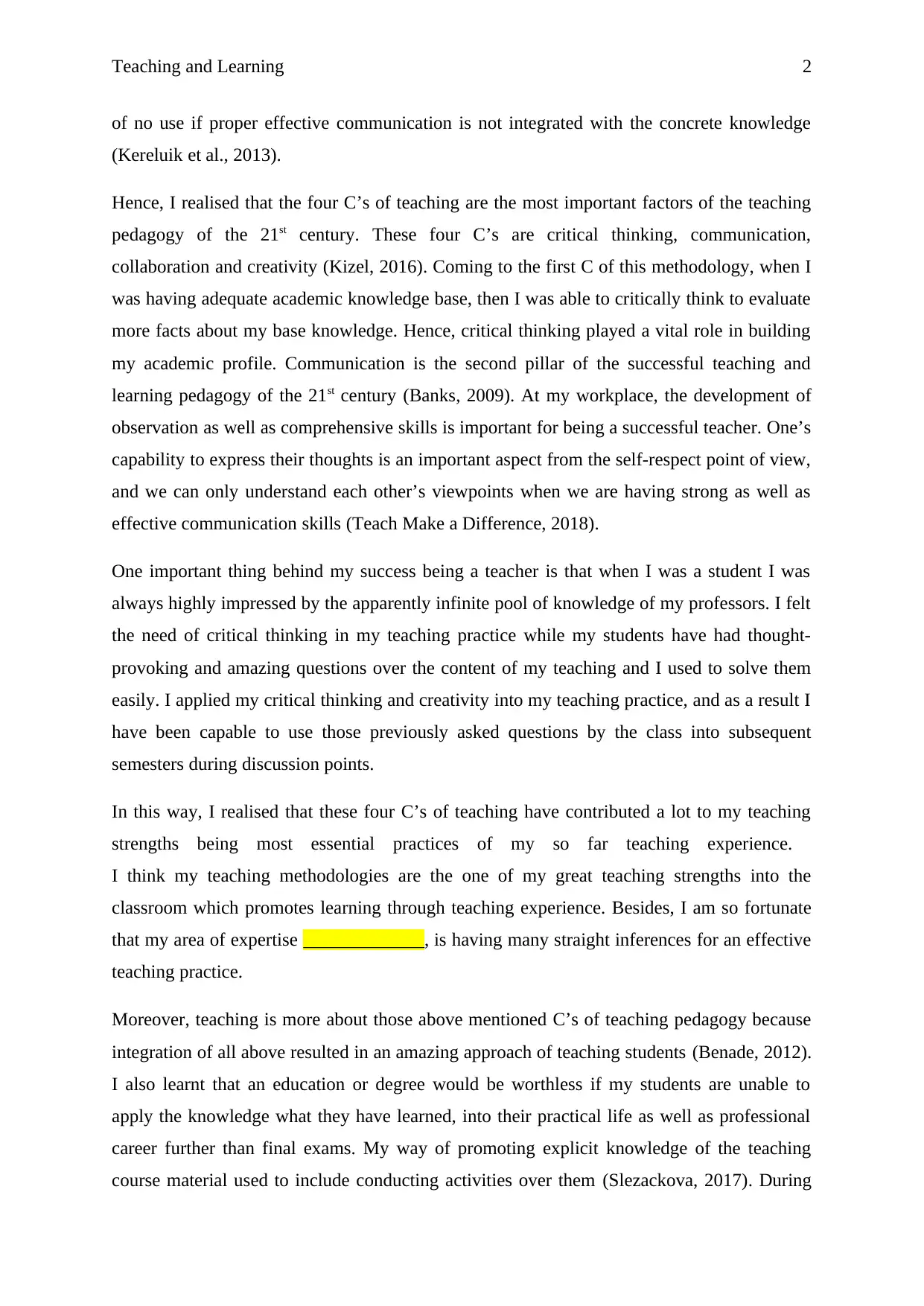
Teaching and Learning 2
of no use if proper effective communication is not integrated with the concrete knowledge
(Kereluik et al., 2013).
Hence, I realised that the four C’s of teaching are the most important factors of the teaching
pedagogy of the 21st century. These four C’s are critical thinking, communication,
collaboration and creativity (Kizel, 2016). Coming to the first C of this methodology, when I
was having adequate academic knowledge base, then I was able to critically think to evaluate
more facts about my base knowledge. Hence, critical thinking played a vital role in building
my academic profile. Communication is the second pillar of the successful teaching and
learning pedagogy of the 21st century (Banks, 2009). At my workplace, the development of
observation as well as comprehensive skills is important for being a successful teacher. One’s
capability to express their thoughts is an important aspect from the self-respect point of view,
and we can only understand each other’s viewpoints when we are having strong as well as
effective communication skills (Teach Make a Difference, 2018).
One important thing behind my success being a teacher is that when I was a student I was
always highly impressed by the apparently infinite pool of knowledge of my professors. I felt
the need of critical thinking in my teaching practice while my students have had thought-
provoking and amazing questions over the content of my teaching and I used to solve them
easily. I applied my critical thinking and creativity into my teaching practice, and as a result I
have been capable to use those previously asked questions by the class into subsequent
semesters during discussion points.
In this way, I realised that these four C’s of teaching have contributed a lot to my teaching
strengths being most essential practices of my so far teaching experience.
I think my teaching methodologies are the one of my great teaching strengths into the
classroom which promotes learning through teaching experience. Besides, I am so fortunate
that my area of expertise _____________, is having many straight inferences for an effective
teaching practice.
Moreover, teaching is more about those above mentioned C’s of teaching pedagogy because
integration of all above resulted in an amazing approach of teaching students (Benade, 2012).
I also learnt that an education or degree would be worthless if my students are unable to
apply the knowledge what they have learned, into their practical life as well as professional
career further than final exams. My way of promoting explicit knowledge of the teaching
course material used to include conducting activities over them (Slezackova, 2017). During
of no use if proper effective communication is not integrated with the concrete knowledge
(Kereluik et al., 2013).
Hence, I realised that the four C’s of teaching are the most important factors of the teaching
pedagogy of the 21st century. These four C’s are critical thinking, communication,
collaboration and creativity (Kizel, 2016). Coming to the first C of this methodology, when I
was having adequate academic knowledge base, then I was able to critically think to evaluate
more facts about my base knowledge. Hence, critical thinking played a vital role in building
my academic profile. Communication is the second pillar of the successful teaching and
learning pedagogy of the 21st century (Banks, 2009). At my workplace, the development of
observation as well as comprehensive skills is important for being a successful teacher. One’s
capability to express their thoughts is an important aspect from the self-respect point of view,
and we can only understand each other’s viewpoints when we are having strong as well as
effective communication skills (Teach Make a Difference, 2018).
One important thing behind my success being a teacher is that when I was a student I was
always highly impressed by the apparently infinite pool of knowledge of my professors. I felt
the need of critical thinking in my teaching practice while my students have had thought-
provoking and amazing questions over the content of my teaching and I used to solve them
easily. I applied my critical thinking and creativity into my teaching practice, and as a result I
have been capable to use those previously asked questions by the class into subsequent
semesters during discussion points.
In this way, I realised that these four C’s of teaching have contributed a lot to my teaching
strengths being most essential practices of my so far teaching experience.
I think my teaching methodologies are the one of my great teaching strengths into the
classroom which promotes learning through teaching experience. Besides, I am so fortunate
that my area of expertise _____________, is having many straight inferences for an effective
teaching practice.
Moreover, teaching is more about those above mentioned C’s of teaching pedagogy because
integration of all above resulted in an amazing approach of teaching students (Benade, 2012).
I also learnt that an education or degree would be worthless if my students are unable to
apply the knowledge what they have learned, into their practical life as well as professional
career further than final exams. My way of promoting explicit knowledge of the teaching
course material used to include conducting activities over them (Slezackova, 2017). During
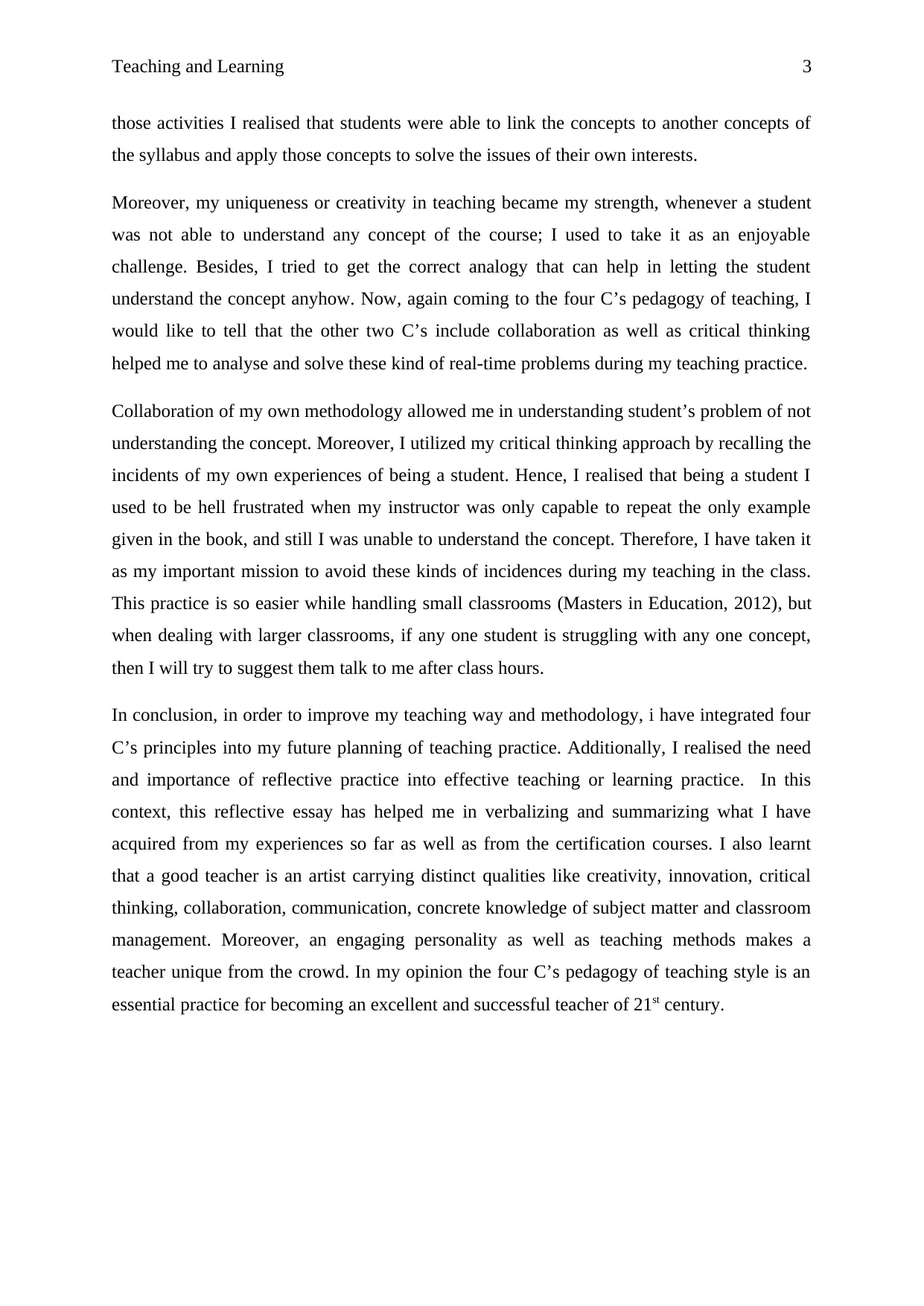
Teaching and Learning 3
those activities I realised that students were able to link the concepts to another concepts of
the syllabus and apply those concepts to solve the issues of their own interests.
Moreover, my uniqueness or creativity in teaching became my strength, whenever a student
was not able to understand any concept of the course; I used to take it as an enjoyable
challenge. Besides, I tried to get the correct analogy that can help in letting the student
understand the concept anyhow. Now, again coming to the four C’s pedagogy of teaching, I
would like to tell that the other two C’s include collaboration as well as critical thinking
helped me to analyse and solve these kind of real-time problems during my teaching practice.
Collaboration of my own methodology allowed me in understanding student’s problem of not
understanding the concept. Moreover, I utilized my critical thinking approach by recalling the
incidents of my own experiences of being a student. Hence, I realised that being a student I
used to be hell frustrated when my instructor was only capable to repeat the only example
given in the book, and still I was unable to understand the concept. Therefore, I have taken it
as my important mission to avoid these kinds of incidences during my teaching in the class.
This practice is so easier while handling small classrooms (Masters in Education, 2012), but
when dealing with larger classrooms, if any one student is struggling with any one concept,
then I will try to suggest them talk to me after class hours.
In conclusion, in order to improve my teaching way and methodology, i have integrated four
C’s principles into my future planning of teaching practice. Additionally, I realised the need
and importance of reflective practice into effective teaching or learning practice. In this
context, this reflective essay has helped me in verbalizing and summarizing what I have
acquired from my experiences so far as well as from the certification courses. I also learnt
that a good teacher is an artist carrying distinct qualities like creativity, innovation, critical
thinking, collaboration, communication, concrete knowledge of subject matter and classroom
management. Moreover, an engaging personality as well as teaching methods makes a
teacher unique from the crowd. In my opinion the four C’s pedagogy of teaching style is an
essential practice for becoming an excellent and successful teacher of 21st century.
those activities I realised that students were able to link the concepts to another concepts of
the syllabus and apply those concepts to solve the issues of their own interests.
Moreover, my uniqueness or creativity in teaching became my strength, whenever a student
was not able to understand any concept of the course; I used to take it as an enjoyable
challenge. Besides, I tried to get the correct analogy that can help in letting the student
understand the concept anyhow. Now, again coming to the four C’s pedagogy of teaching, I
would like to tell that the other two C’s include collaboration as well as critical thinking
helped me to analyse and solve these kind of real-time problems during my teaching practice.
Collaboration of my own methodology allowed me in understanding student’s problem of not
understanding the concept. Moreover, I utilized my critical thinking approach by recalling the
incidents of my own experiences of being a student. Hence, I realised that being a student I
used to be hell frustrated when my instructor was only capable to repeat the only example
given in the book, and still I was unable to understand the concept. Therefore, I have taken it
as my important mission to avoid these kinds of incidences during my teaching in the class.
This practice is so easier while handling small classrooms (Masters in Education, 2012), but
when dealing with larger classrooms, if any one student is struggling with any one concept,
then I will try to suggest them talk to me after class hours.
In conclusion, in order to improve my teaching way and methodology, i have integrated four
C’s principles into my future planning of teaching practice. Additionally, I realised the need
and importance of reflective practice into effective teaching or learning practice. In this
context, this reflective essay has helped me in verbalizing and summarizing what I have
acquired from my experiences so far as well as from the certification courses. I also learnt
that a good teacher is an artist carrying distinct qualities like creativity, innovation, critical
thinking, collaboration, communication, concrete knowledge of subject matter and classroom
management. Moreover, an engaging personality as well as teaching methods makes a
teacher unique from the crowd. In my opinion the four C’s pedagogy of teaching style is an
essential practice for becoming an excellent and successful teacher of 21st century.
Secure Best Marks with AI Grader
Need help grading? Try our AI Grader for instant feedback on your assignments.
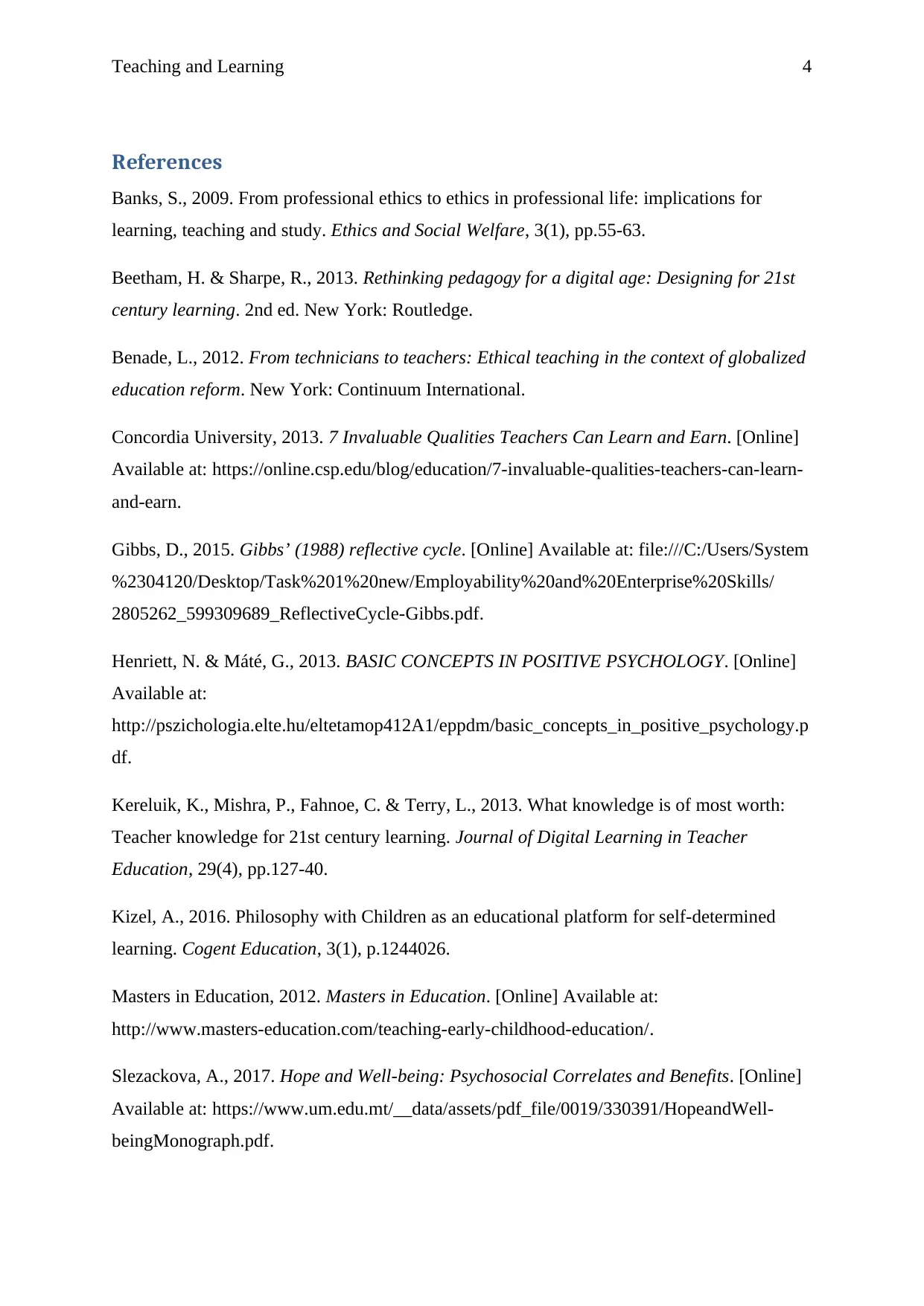
Teaching and Learning 4
References
Banks, S., 2009. From professional ethics to ethics in professional life: implications for
learning, teaching and study. Ethics and Social Welfare, 3(1), pp.55-63.
Beetham, H. & Sharpe, R., 2013. Rethinking pedagogy for a digital age: Designing for 21st
century learning. 2nd ed. New York: Routledge.
Benade, L., 2012. From technicians to teachers: Ethical teaching in the context of globalized
education reform. New York: Continuum International.
Concordia University, 2013. 7 Invaluable Qualities Teachers Can Learn and Earn. [Online]
Available at: https://online.csp.edu/blog/education/7-invaluable-qualities-teachers-can-learn-
and-earn.
Gibbs, D., 2015. Gibbs’ (1988) reflective cycle. [Online] Available at: file:///C:/Users/System
%2304120/Desktop/Task%201%20new/Employability%20and%20Enterprise%20Skills/
2805262_599309689_ReflectiveCycle-Gibbs.pdf.
Henriett, N. & Máté, G., 2013. BASIC CONCEPTS IN POSITIVE PSYCHOLOGY. [Online]
Available at:
http://pszichologia.elte.hu/eltetamop412A1/eppdm/basic_concepts_in_positive_psychology.p
df.
Kereluik, K., Mishra, P., Fahnoe, C. & Terry, L., 2013. What knowledge is of most worth:
Teacher knowledge for 21st century learning. Journal of Digital Learning in Teacher
Education, 29(4), pp.127-40.
Kizel, A., 2016. Philosophy with Children as an educational platform for self-determined
learning. Cogent Education, 3(1), p.1244026.
Masters in Education, 2012. Masters in Education. [Online] Available at:
http://www.masters-education.com/teaching-early-childhood-education/.
Slezackova, A., 2017. Hope and Well-being: Psychosocial Correlates and Benefits. [Online]
Available at: https://www.um.edu.mt/__data/assets/pdf_file/0019/330391/HopeandWell-
beingMonograph.pdf.
References
Banks, S., 2009. From professional ethics to ethics in professional life: implications for
learning, teaching and study. Ethics and Social Welfare, 3(1), pp.55-63.
Beetham, H. & Sharpe, R., 2013. Rethinking pedagogy for a digital age: Designing for 21st
century learning. 2nd ed. New York: Routledge.
Benade, L., 2012. From technicians to teachers: Ethical teaching in the context of globalized
education reform. New York: Continuum International.
Concordia University, 2013. 7 Invaluable Qualities Teachers Can Learn and Earn. [Online]
Available at: https://online.csp.edu/blog/education/7-invaluable-qualities-teachers-can-learn-
and-earn.
Gibbs, D., 2015. Gibbs’ (1988) reflective cycle. [Online] Available at: file:///C:/Users/System
%2304120/Desktop/Task%201%20new/Employability%20and%20Enterprise%20Skills/
2805262_599309689_ReflectiveCycle-Gibbs.pdf.
Henriett, N. & Máté, G., 2013. BASIC CONCEPTS IN POSITIVE PSYCHOLOGY. [Online]
Available at:
http://pszichologia.elte.hu/eltetamop412A1/eppdm/basic_concepts_in_positive_psychology.p
df.
Kereluik, K., Mishra, P., Fahnoe, C. & Terry, L., 2013. What knowledge is of most worth:
Teacher knowledge for 21st century learning. Journal of Digital Learning in Teacher
Education, 29(4), pp.127-40.
Kizel, A., 2016. Philosophy with Children as an educational platform for self-determined
learning. Cogent Education, 3(1), p.1244026.
Masters in Education, 2012. Masters in Education. [Online] Available at:
http://www.masters-education.com/teaching-early-childhood-education/.
Slezackova, A., 2017. Hope and Well-being: Psychosocial Correlates and Benefits. [Online]
Available at: https://www.um.edu.mt/__data/assets/pdf_file/0019/330391/HopeandWell-
beingMonograph.pdf.
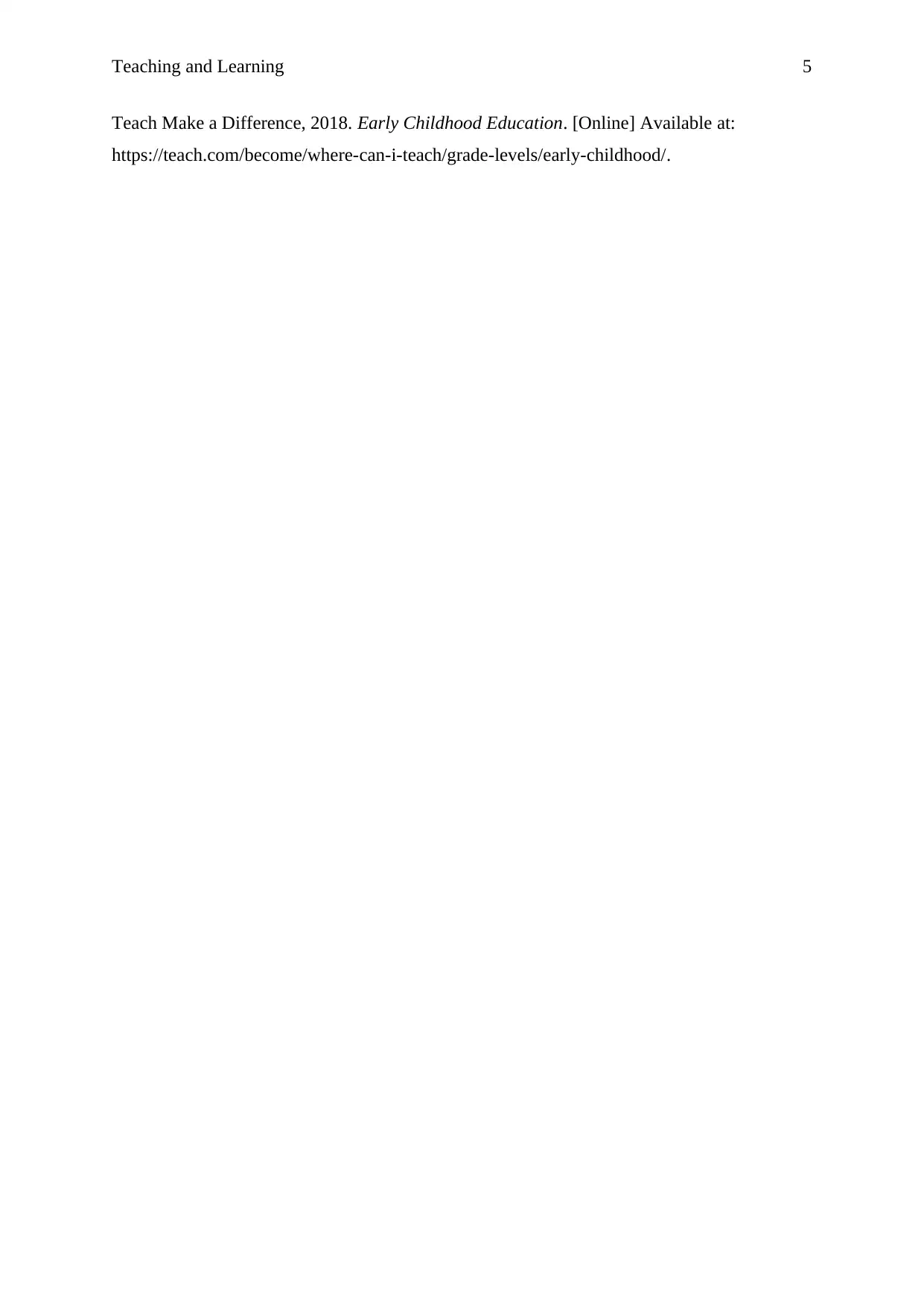
Teaching and Learning 5
Teach Make a Difference, 2018. Early Childhood Education. [Online] Available at:
https://teach.com/become/where-can-i-teach/grade-levels/early-childhood/.
Teach Make a Difference, 2018. Early Childhood Education. [Online] Available at:
https://teach.com/become/where-can-i-teach/grade-levels/early-childhood/.
1 out of 6
Related Documents
Your All-in-One AI-Powered Toolkit for Academic Success.
+13062052269
info@desklib.com
Available 24*7 on WhatsApp / Email
![[object Object]](/_next/static/media/star-bottom.7253800d.svg)
Unlock your academic potential
© 2024 | Zucol Services PVT LTD | All rights reserved.




